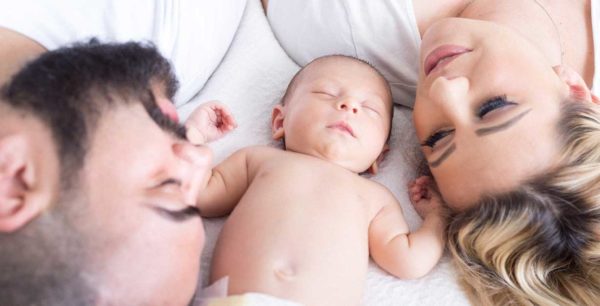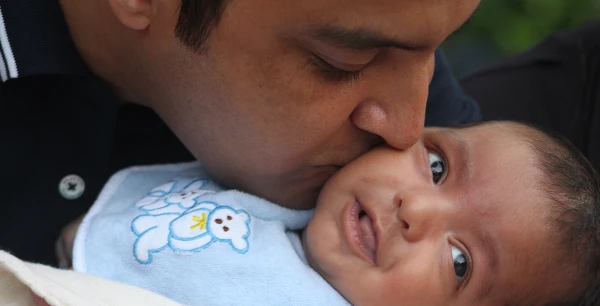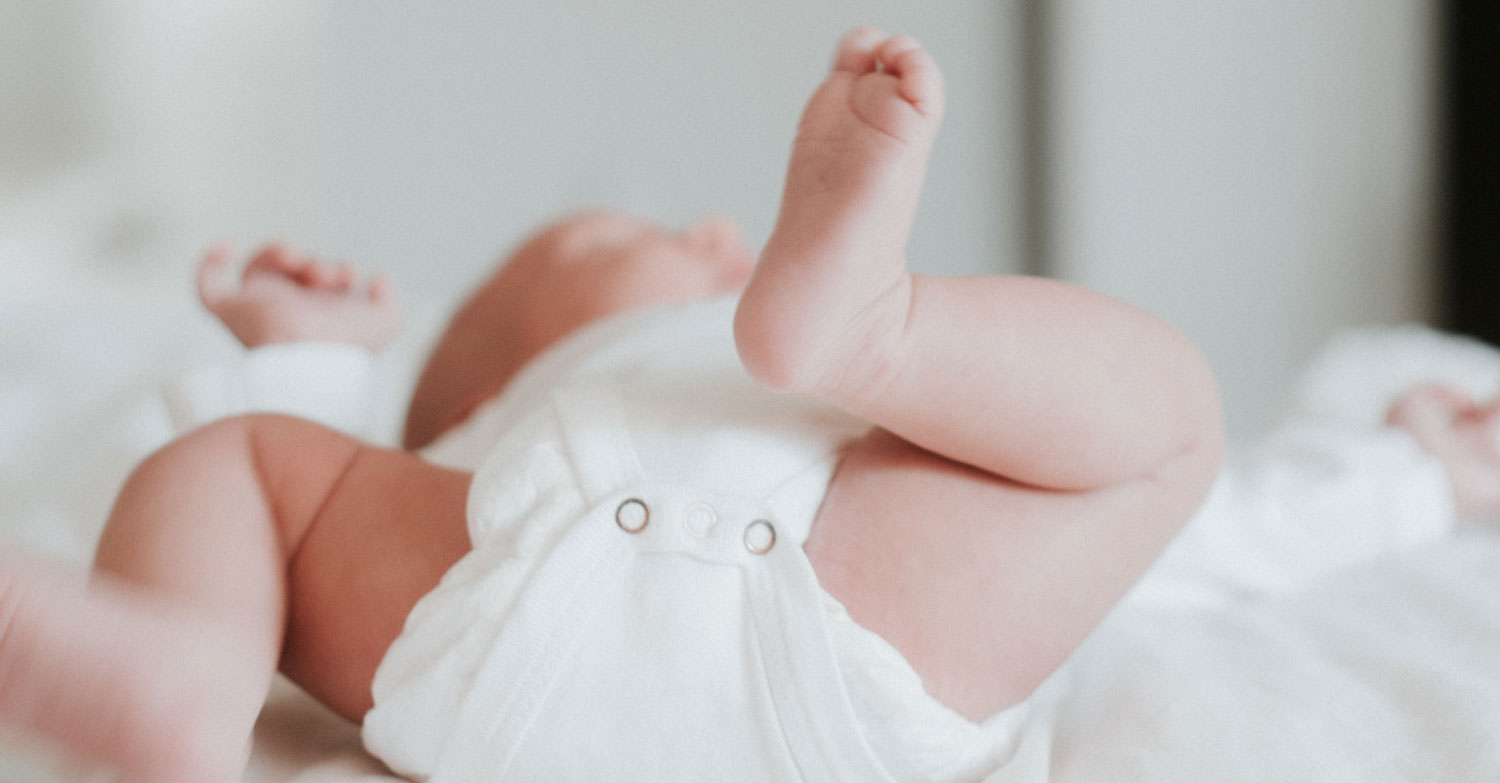Sleep Deprivation in New Parents: Learn All About Newborn Sleep
When you prepare for your baby, you make sure everything is in order, right down to your baby’s sleeping arrangements. You make sure that you have washed her clothes, set up the changing table, and you pack your hospital bag. You make sure that all the feeding supplies are sanitized and ready for use, and that the dog is groomed to meet his new sibling. As new (or new again) parents, we try to prepare for everything. We really, truly cannot prepare for is the utter exhaustion from sleep deprivation.
- What sleep deprivation does to you
- What do do about your sleep deprivation
- How to ask for help
- What you can do before formal sleep training
Newborn Sleep Patterns are Not Very Predictable
When I say up all night, I mean up ALL night. For the first few weeks of life, your baby needs to eat every 2-3 hours around the clock. It gets better as baby gets older and feedings can stretch to 3-4 hours. It’s not until at least 6 months that most babies are ready to truly “sleep through the night”. For some babies, this stage is even longer.
In addition to startling awake, your baby needs to eat around the clock to help put on much needed fat. Many parents notice that once their baby starts to develop some adorable rolls (sometime between four and six weeks), their baby “suddenly” begins to sleep longer stretches. It’s possible that the addition of body fat allows your baby to go longer between feedings.
Your new baby is completely dependent on you for everything. He doesn’t know how to fall asleep, and thanks to the startle reflex, he may feel like he’s falling when he “startles” awake. How’s that for scary? This is why many parents swaddle, or use one of the many swaddle-type products on the market to help prevent the startle, or Moro reflex.
Want to calm your newborn? Try massage!
Read: Infant Massage – Ten Steps to a More Peaceful Baby
Moms Suffer a Large Amount of Sleep Deprivation
Research has found that new moms lose an average of 44 DAYS of sleep in the first year of their baby’s life. That’s a whopping 1,056 hours of sleep. Or, if you look at it in another light, more than a month of sleep! New dad’s fare better, but they lose sleep as well. This sleep deprivation is temporary, but it does take a huge toll on your mind and body.
Knowing this, and being aware that your baby will not develop the ability to self-soothe (a fancy way of saying that your baby cannot put himself to sleep) until around 6 months of age, the journey can seem daunting, especially when you aren’t sleeping.
In a nutshell, you are going to be sleep deprived. Sleep deprivation can have serious consequences.
Sleep Deprivation Affects Mood
Studies have shown that not getting enough sleep can cause you to be in a bad mood. Which means that new parents are at greater risk for depression, including PPD. New moms who are able to get more sleep tend to have a better handle on their moods, though this is not a guarantee.
If you feel that you are depressed, please seek help, either through Dr. Shosh, or your own doctor. There’s no need to suffer alone.
Sleep deprivation when you have a newborn or baby is not your fault!
Read: We Must Stop Blaming Parents for Baby Sleep Problems
Have “Mommy Brain”? Sleep Deprivation is the Culprit
Not getting enough sleep can affect everything from driving to your ability to communicate. Many new moms find that they take longer to form a coherent sentence than it used to. Some jokingly refer to it as “mommy brain.”
Know that with a lack of sleep, your ability to make sound decisions and have an effective reaction time may be compromised. If you feel exhausted, avoid driving anywhere, and please ask for help if you are struggling with everyday tasks.
Thankfully, there are things that you can do to help ensure that you get as much sleep as possible.

Pay Attention to Sleep Deprivation by Tracking your Baby
This may seem like strange advice, and I could just tell you to sleep when the baby sleeps, but most moms don’t realize just how little sleep they are getting at night. It can be helpful to use an app to track your baby’s sleep and feeding patterns during the night so that you can be aware just how often you are waking.
If that isn’t an option, keeping a hand-written log, even if it’s just jotting down times, can help you to see how much sleep you are missing. Knowing that you are short on sleep can help you to prioritize and adjust to a temporary “sleep when baby sleeps” schedule.
Make Your Sleep a Priority
I know it’s tempting to catch up on your favorite television program, but sleep truly is far more important, especially in the first few months when your baby is sleeping shorter periods at night. If you can manage naps (I realize that some adults have a very difficult time sleeping during the day), now is the time to take them.
If you’re skipping potential naps because of dishes or housework, know that it can wait. Ask your partner to help you, or consider enlisting a mommy’s helper so that you can rest, even if it’s just once a week.
A rested parent is a better parent.
Read: Parent Sleep — My Baby Sleeps, Why Can’t I? Sleep Tips for Parents
Shut Down the Screens at Bedtime
This means your television, smart phone, computer, Kindle, ipad…you get the idea. Screen time interferes with your body’s ability to produce melatonin, so you want to make sure that you avoid them for at least 30 minutes before you plan to go to sleep. If you need to wind down, consider a good old-fashioned book.
Stick to a Set Bedtime
Know yourself. If you are someone who will stay up “until,” give yourself a hard and fast bedtime. Shoot for earlier in the night so that you can get as much sleep as possible.
Go Easy on YOU
Know that these first few months are going to be difficult due to sleep deprivation, and know that the dishes can wait.

Easy to read and follow, kiddo is sleeping 12 hours
"This more gentle approach was perfect for us and by night #3 she slept 12 hours and I feel like a new person."
Ask for Specific Help
If you have friends and family, likely, they’ve asked what they can do to help. Give them a task. Ask them to prepare a meal for you, or tell your friends that you could really use someone to do the laundry. People want to help, and if you accept their help, it gives you time to rest.
Get Ready to Sleep Coach
Newborn sleep patterns take awhile to consolidate. Your baby will not be ready for sleep coaching until around 6 months old, but that doesn’t mean you can’t prepare. There are lots of gentle ways that you can encourage positive sleep associations in your newborn. Teaching them to fall asleep on their own by putting them to bed “Drowsy But Awake” is a first step you can start with your baby.



